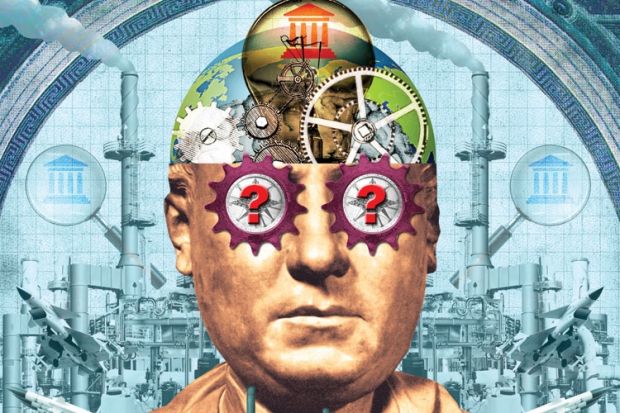Source: Miles Cole
The crisis of our times is that we have science without wisdom. This is the crisis behind all the others.
Science and technology have given us the benefits of modern industry, agriculture, hygiene and medicine, which in turn have led to a host of global problems. These include population growth, the terrifyingly lethal character of modern war and terrorism, immense disparities in wealth, destruction of tropical rainforests and other natural habitats, rapid mass extinction of species, pollution of sea, earth and air and, above all, the impending disasters of climate change.
Many blame science, but that misses the point. The problem lies with science that is dissociated from a more fundamental concern with helping humanity learn how to tackle problems of living in increasingly cooperatively rational ways, so that we may gradually discover how to make progress towards a better, wiser world. Knowledge is important, but in the end it is what we do, or refrain from doing, that enables us to achieve what is of value in life.
We need an academic revolution, one that puts problems of living – personal, social and global – at the heart of the enterprise. Social enquiry and the humanities need to be transformed so that their basic task becomes that of identifying and articulating these problems and proposing and critically assessing possible solutions: actions, policies, institutional and social changes, political programmes, ways of living, philosophies of life. Our best ideas about what to do would influence the priorities of scientific and technological research – and, of course, deliberations concerning actions and policy would need to take the results of scientific research into account.
Natural science also needs to change, to examine critically not merely evidence and theory but also research aims – which contain problematic assumptions concerning metaphysics, values and politics. Aims in life in general are often problematic: they too need sustained imaginative and critical exploration, within and without academia, in the hope that they – and our lives – can thereby be improved.
Each nation needs, within its university system, a virtual government that, free of the constraints of the actual government, seeks to work out what the actual government ought to do. Something similar is needed for the world as a whole. The whole relationship between academia and the social world needs to change, so that academia does not just study the social world, but rather is in two-way debate with it. The fundamental concern would be to help the public world educate itself about what needs to be done to make progress towards as good a world as possible.
But this certainly does not mean that all scientific research would be related to practical problems of living. We need pure research both because scientific knowledge and understanding can be of intrinsic value for all of us and because pure research often leads unexpectedly to solutions to practical problems of living.
Does recent emphasis on the importance of the “impact” of research amount to a step towards the kind of university I have in mind? Not really. “Impact” as defined by the research councils does not involve the university giving priority to tackling problems of living over problems of knowledge. What constitutes social “impact” is characterised in rather broad terms, and may actually contribute to making some global problems worse. And the criteria fail to do justice to research of great value whose “impact” is either non-existent or only potential or long term.
Of greater relevance are programmes such as the Grand Challenges project developed by University College London, which aim to bring specialists together to work on global problems. There is here an input from my own work and UCL refers, on its website, to “the Wisdom Agenda” and “delivering a culture of wisdom”. But, important though this programme is, UCL as a whole does not give intellectual priority to tackling problems of living. This could not be done by one university alone anyway, as disciplines need to change, as well as university organisation.
Why would the academic revolution I describe contribute to resolving global problems? Our only hope of solving our global problems is to do so democratically. But governments are unlikely to be much more enlightened than electorates, so we require electorates to have a good understanding of what our problems are and what we need to do about them. Public capacity to act intelligently and effectively in response to these problems is catastrophically lacking in our modern world, but this need could be met by universities reforming themselves in the way I have indicated. The basic task would be to help people discover what needs to be done to ensure that governments (and industry, agriculture and commerce) begin to do what is necessary to resolve our global problems.
At present, universities’ primary focus on the pursuit of knowledge prevents them from serving this purpose. Indeed, universities’ pursuit of that goal is likely, if anything, to intensify our global problems. For the long-term interests of humanity, it is imperative that universities instead put tackling problems of living, and the improvement of problematic aims, at the heart of the academic enterprise.
Register to continue
Why register?
- Registration is free and only takes a moment
- Once registered, you can read 3 articles a month
- Sign up for our newsletter
Subscribe
Or subscribe for unlimited access to:
- Unlimited access to news, views, insights & reviews
- Digital editions
- Digital access to THE’s university and college rankings analysis
Already registered or a current subscriber? Login





